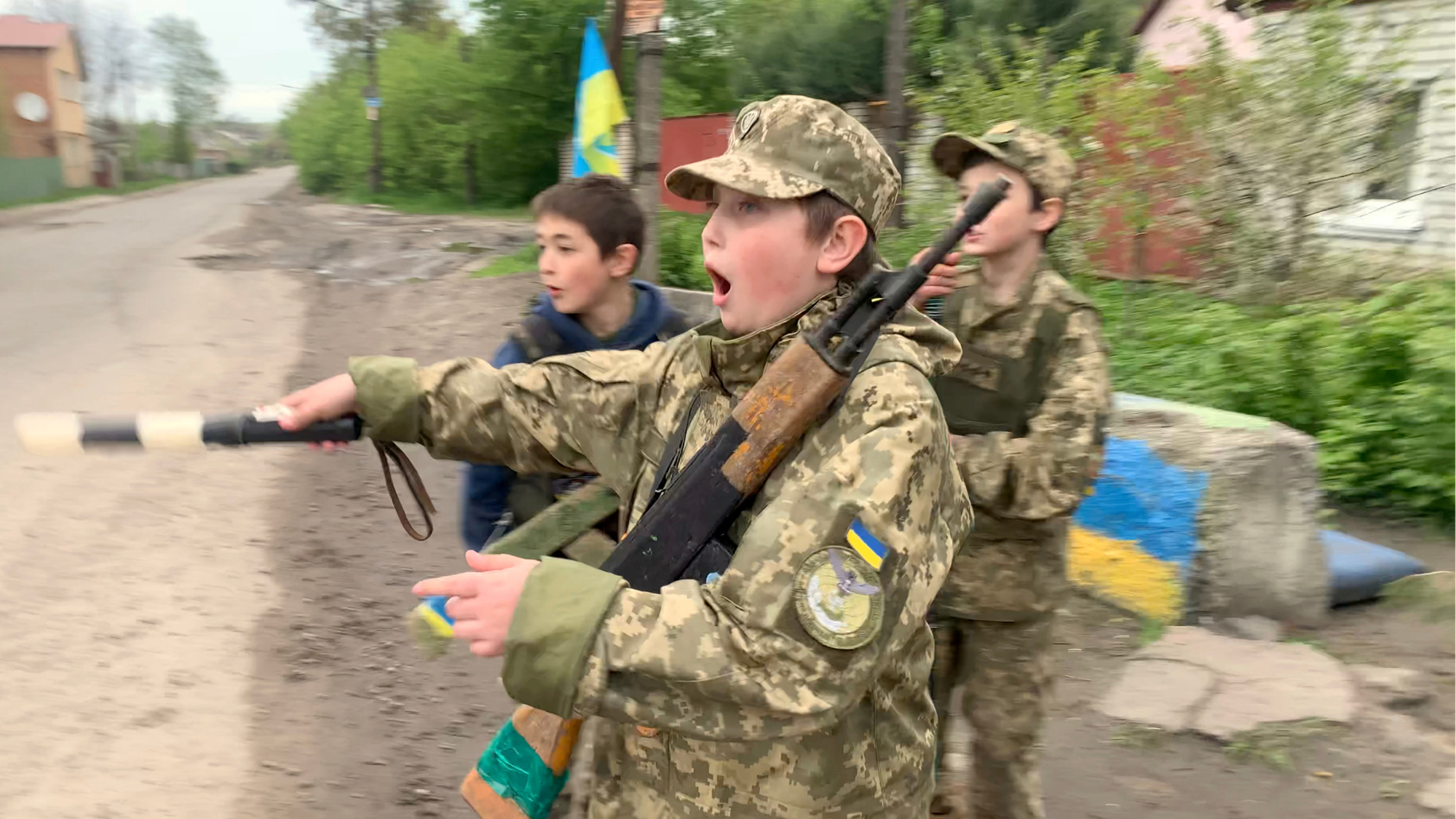Francis Alÿs: Ricochets – a 'heart-stopping' exhibition at London's Barbican
'Mesmerising' films of children at play around the world from Kharkiv to Mosul

A free daily email with the biggest news stories of the day – and the best features from TheWeek.com
You are now subscribed
Your newsletter sign-up was successful
Francis Alÿs "is one of the most humane and poetic artists at work today", said Laura Cumming in The Observer.
Born in Antwerp in 1959 and long based in Mexico, he is probably best known for his "tremendous" ongoing video series "Children's Games". Since 1999, he has been filming children at play all over the world, his camera recording everything from snail racing in Belgium to improvised games of jacks in Nepal to kite flying in Afghanistan – an activity famously banned by the Taliban.
Each film is "brief, enthralling to watch and beautifully observed". Each shows "inventiveness, vitality, resourcefulness, joy" – the "power of resilience and solidarity" of childhood play. This show at London's Barbican brings together many of the 40-plus videos the artist has made to date, alongside drawings and animations created over the course of his travels.
The Week
Escape your echo chamber. Get the facts behind the news, plus analysis from multiple perspectives.

Sign up for The Week's Free Newsletters
From our morning news briefing to a weekly Good News Newsletter, get the best of The Week delivered directly to your inbox.
From our morning news briefing to a weekly Good News Newsletter, get the best of The Week delivered directly to your inbox.
It is a "mesmerising" exhibition that demands to be seen. "Ricochets" is a "cacophonous" experience, said Anna Parker in ArtReview magazine. Ten films play at once in a single gallery, filling the space with "shrieking and laughing", as well as the onslaught of sound created by the games themselves: in Havana, children race across "unfinished concrete" on improvised go-karts; snow makes a "squeaky crunch" as it is compacted under the weight of sledges in Switzerland; in Morocco, kids clack pebbles together before skimming them across the sea towards Gibraltar.
That many videos have been made in combat zones is no coincidence: "in wartime settings, children are powerless, but because ordinary routines have been disrupted, perversely they are left freer to play". Alÿs captures one example in Kharkiv, where he films boys dressed in combat fatigues manning a makeshift checkpoint and flagging down cars to inspect papers or demand a password (the Ukrainian word for bread, which Russians find hard to pronounce).
Violence frequently punctures the fun, said Adrian Searle in The Guardian. One film sees a group of Ukrainian children playing a game called "Air Raid Alert", in which voices imitating the noise of sirens become "intolerable" for one young participant, who "suddenly flees the camera".
In Mosul, Iraqi adolescents play football, running and tackling amid "burnt-out cars and shattered buildings", stopping only when gunfire interrupts play. It takes a moment to notice that they don't actually have a ball; in 2015, a caption informs us, 13 teenage boys were publicly executed by Islamic State for the crime of watching a televised football match.
A free daily email with the biggest news stories of the day – and the best features from TheWeek.com
The show never feels intrusive or voyeuristic: whatever he does, Alÿs's work is always "a collaboration with the participants" and he knows "when to stop". "Ricochets" is "an often heart-stopping and frequently beautiful" exhibition.
Barbican Art Gallery, London EC1. Until 1 September
-
 The environmental cost of GLP-1s
The environmental cost of GLP-1sThe explainer Producing the drugs is a dirty process
-
 Greenland’s capital becomes ground zero for the country’s diplomatic straits
Greenland’s capital becomes ground zero for the country’s diplomatic straitsIN THE SPOTLIGHT A flurry of new consular activity in Nuuk shows how important Greenland has become to Europeans’ anxiety about American imperialism
-
 ‘This is something that happens all too often’
‘This is something that happens all too often’Instant Opinion Opinion, comment and editorials of the day
-
 Arcadia: Tom Stoppard’s ‘masterpiece’ makes a ‘triumphant’ return
Arcadia: Tom Stoppard’s ‘masterpiece’ makes a ‘triumphant’ returnThe Week Recommends Carrie Cracknell’s revival at the Old Vic ‘grips like a thriller’
-
 My Father’s Shadow: a ‘magically nimble’ love letter to Lagos
My Father’s Shadow: a ‘magically nimble’ love letter to LagosThe Week Recommends Akinola Davies Jr’s touching and ‘tender’ tale of two brothers in 1990s Nigeria
-
 Send Help: Sam Raimi’s ‘compelling’ plane-crash survival thriller
Send Help: Sam Raimi’s ‘compelling’ plane-crash survival thrillerThe Week Recommends Rachel McAdams stars as an office worker who gets stranded on a desert island with her boss
-
 The 8 best superhero movies of all time
The 8 best superhero movies of all timethe week recommends A genre that now dominates studio filmmaking once struggled to get anyone to take it seriously
-
 Book reviews: ‘Hated by All the Right People: Tucker Carlson and the Unraveling of the Conservative Mind’ and ‘Football’
Book reviews: ‘Hated by All the Right People: Tucker Carlson and the Unraveling of the Conservative Mind’ and ‘Football’Feature A right-wing pundit’s transformations and a closer look at one of America’s favorite sports
-
 One great cookbook: Joshua McFadden’s ‘Six Seasons of Pasta’
One great cookbook: Joshua McFadden’s ‘Six Seasons of Pasta’the week recommends The pasta you know and love. But ever so much better.
-
 How to navigate dating apps to find ‘the one’
How to navigate dating apps to find ‘the one’The Week Recommends Put an end to endless swiping and make real romantic connections
-
 Catherine O'Hara: The madcap actress who sparkled on ‘SCTV’ and ‘Schitt’s Creek’
Catherine O'Hara: The madcap actress who sparkled on ‘SCTV’ and ‘Schitt’s Creek’Feature O'Hara cracked up audiences for more than 50 years